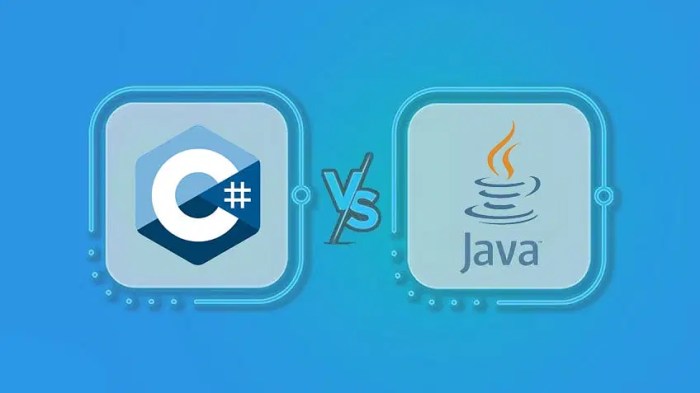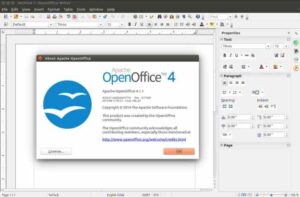Java Vs C# Career Opportunities Comparison
Java vs C# career opportunities comparison explores the contrasting landscapes of these two popular programming languages. From historical contexts to current market demands, this analysis delves into the skills, career paths, and industry applications for each. We’ll examine the evolving job market, highlighting salary ranges, projected growth, and typical job responsibilities.
This comprehensive comparison will equip you with a deeper understanding of the opportunities available in both Java and C# development. We’ll cover everything from basic syntax and development environments to specialized career paths and the supporting communities. Understanding the differences in frameworks, tools, and industry applications is key to making informed career decisions.
Introduction to Java and C#

Source: medium.com
Java, a language with roots in the early 1990s, was initially designed for developing interactive television applications. Its platform independence, facilitated by the Java Virtual Machine (JVM), quickly made it a popular choice for enterprise applications, particularly in the web development space. This platform independence, coupled with a robust ecosystem of libraries and frameworks, has contributed to its sustained popularity.
C#, developed by Microsoft in the late 1990s, is tightly integrated with the .NET framework. Its primary focus has been on building applications for the Windows ecosystem, evolving to encompass broader cross-platform development through .NET Core and .NET 5 and beyond.Both languages offer powerful features for building complex applications, yet they cater to slightly different development needs and paradigms.
Java excels in large-scale, enterprise-level projects, while C# thrives in the Microsoft ecosystem and broader .NET development environments. Their core functionalities and syntax differ, but their overall purpose is to provide developers with tools to create efficient and reliable software solutions.
Java’s History and Evolution
Java’s development was initially driven by the need for a language that could run on various platforms without recompilation. The creation of the Java Virtual Machine (JVM) was a pivotal moment, enabling “write once, run anywhere” capability. Subsequent iterations of Java have focused on enhancing performance, incorporating new features, and improving the overall developer experience. The evolution has seen the integration of modern programming paradigms like functional programming, as well as increased emphasis on security and scalability.
C#’s Origins and Relationship to .NET
C# was developed by Microsoft as a language closely tied to the .NET framework. Its design emphasized interoperability with other .NET languages and components, creating a rich ecosystem for building applications across the Microsoft platform. Over time, C# has expanded its reach beyond Windows, gaining prominence in cross-platform development with the introduction of .NET Core and .NET 5 and beyond.
This evolution has allowed developers to leverage C# across various operating systems, showcasing its adaptability and growth.
Core Programming Paradigms
Java primarily adheres to the object-oriented paradigm, emphasizing classes, objects, inheritance, and polymorphism. C#, also object-oriented, shares these features with Java, but its design incorporates features that align with aspects of functional programming. This integration of object-oriented and functional concepts makes C# versatile for diverse programming needs. Both languages offer strong typing and memory management features, crucial for large-scale application development.
Development Environments
Java development environments typically involve the use of Integrated Development Environments (IDEs) like Eclipse or IntelliJ IDEA, which provide comprehensive tools for code editing, debugging, and compilation. Java projects usually rely on the Java Development Kit (JDK) for compilation and execution. C# development often utilizes Visual Studio, a powerful IDE with integrated support for the .NET framework. The .NET SDK provides the necessary tools for building, running, and deploying applications developed in C#.
Basic Syntax Comparison
| Feature | Java | C# |
|---|---|---|
| Data Types | `int`, `float`, `String`, `boolean` | `int`, `float`, `string`, `bool` |
| Object Creation | `MyObject obj = new MyObject();` | `MyObject obj = new MyObject();` |
| Class Declaration | `public class MyClass … ` | `public class MyClass … ` |
| Method Declaration | `public int myMethod(int a, int b) … ` | `public int myMethod(int a, int b) … ` |
This table highlights some fundamental syntax differences. While the core concepts are similar, the specific s and syntax used can vary slightly, requiring developers to adapt to the particular language’s conventions.
Skillsets Required for Each Language
Java and C# are both popular programming languages with strong communities and extensive application domains. Understanding the specific skillsets required for each language is crucial for aspiring developers aiming to excel in their chosen field. This section delves into the essential skills needed for success in both Java and C#, highlighting the key differences and highlighting the frameworks and libraries that are pivotal for each.The varying landscapes of Java and C# projects necessitate different skillsets.
Java developers often focus on large-scale applications and enterprise-level systems, demanding a strong grasp of object-oriented principles and multi-threading concepts. C# developers, meanwhile, frequently work on applications and games for Windows and other platforms, emphasizing a blend of programming and design skills, particularly when integrating with other technologies.
Essential Skills for Java Developers
A successful Java developer possesses a solid foundation in object-oriented programming (OOP), including concepts like encapsulation, inheritance, and polymorphism. Proficiency in Java’s core language features, such as data types, control flow statements, and exception handling, is fundamental. Understanding and implementing multi-threading techniques is critical for handling concurrent tasks efficiently. Expertise in various Java libraries, particularly the Collections Framework, is essential for data manipulation and management.
Familiarity with testing frameworks, like JUnit, is often a requirement for quality assurance. Lastly, experience with build tools like Maven or Gradle is highly valued.
Crucial Skills for C# Proficiency
C# developers must be adept at object-oriented programming (OOP) concepts. They also need a strong understanding of C#’s syntax, data types, control flow, and exception handling. A good grasp of .NET Framework or .NET Core is essential for integrating with other .NET components. Experience with Windows development, including graphical user interfaces (GUIs), is frequently encountered in C# projects.
Knowledge of design patterns and their application is valuable for creating maintainable and scalable applications. Proficiency with testing frameworks, such as NUnit, is desirable. Additionally, understanding of design patterns and their application is crucial.
Differences in Skill Sets
While both languages share OOP principles, Java’s focus on enterprise-level applications and the need for multi-threading differentiate it from C# which is often used in Windows application development. Java developers are often more familiar with frameworks like Spring for enterprise-level applications, while C# developers frequently leverage frameworks tailored for Windows development and .NET integration. C# often involves more interaction with Windows-specific technologies.
Furthermore, Java developers typically engage with more open-source projects and diverse ecosystems.
Java Frameworks and Libraries
Java boasts a rich ecosystem of frameworks and libraries, contributing to its versatility. The Spring Framework, for instance, is widely used for building enterprise applications, offering features like dependency injection and aspect-oriented programming. The Hibernate framework is a popular ORM (Object-Relational Mapping) tool. The Java Collections Framework provides data structures for efficient data manipulation.
C# Frameworks and Libraries
C# benefits from the robust .NET ecosystem, offering a wide range of frameworks and libraries. The .NET Framework, or the more modern .NET Core, are crucial for development. Entity Framework Core is a prominent ORM solution. ASP.NET is a comprehensive framework for building web applications. WPF (Windows Presentation Foundation) and UWP (Universal Windows Platform) are used for developing Windows-based applications.
Comparison of Frameworks/Libraries
| Framework/Library | Java | C# | Description |
|---|---|---|---|
| Spring Framework | Yes | No | Popular for enterprise applications, offering dependency injection and other features. |
| Hibernate | Yes | No | A prominent ORM (Object-Relational Mapping) tool for Java. |
| Entity Framework Core | No | Yes | A popular ORM solution for .NET applications. |
| ASP.NET | No | Yes | A framework for building web applications in C#. |
| WPF/UWP | No | Yes | Used for Windows-based applications in C#. |
Career Paths and Specializations
Java and C# are popular choices for software development, offering diverse career paths. Understanding the specializations within each language and the potential industry applications is crucial for career planning. This section explores the diverse career options available to developers proficient in these languages, highlighting the nuances of each path and the transferable skills between them.Choosing a career path often depends on personal interests and strengths.
Some developers excel in designing and building intricate backend systems, while others might be drawn to the interactive world of mobile application development. The range of specialization opportunities available within each language is vast, with many possibilities for specialization and career advancement.
Java Career Paths
Java’s widespread use in enterprise applications, Android development, and large-scale systems creates numerous career opportunities.
- Backend Development: Java’s robust ecosystem, including frameworks like Spring, facilitates building scalable and reliable backend systems for web applications and APIs. This often involves tasks like database management, API design, and server-side logic.
- Android Development: Java, through the Android SDK, is essential for developing applications for Android devices. This involves designing user interfaces, handling user interactions, and integrating with various Android functionalities.
- Big Data and Cloud Computing: Java’s efficiency and scalability make it suitable for handling large datasets and cloud-based applications. Developers skilled in Hadoop, Spark, and cloud platforms like AWS or Azure are in high demand.
- Embedded Systems: Java ME (Micro Edition) is used for developing applications running on resource-constrained devices like embedded systems. This area requires expertise in real-time programming and resource management.
C# Career Paths
C# is a versatile language used in a wide range of applications, from backend development to game development.
- Backend Development: C# excels in backend development, particularly with .NET frameworks like ASP.NET Core, enabling developers to build robust and efficient web applications and APIs. This involves database interaction, API design, and server-side logic.
- Game Development: Unity, a popular game engine, heavily relies on C#. Game developers proficient in C# can design and develop 2D and 3D games with advanced graphics and gameplay mechanics.
- Desktop Application Development: C# and .NET offer tools for creating Windows desktop applications, including Windows Forms and WPF, allowing developers to build robust and visually appealing applications.
- Mobile Development (Xamarin): Xamarin uses C# to develop cross-platform mobile applications. This approach allows developers to use a single codebase for applications across multiple platforms.
Specialization Opportunities Comparison, Java vs C# career opportunities comparison
Both languages provide a wide array of specializations. Java’s strength lies in enterprise applications, big data, and Android development. C# is prominent in game development, desktop applications, and cross-platform mobile development through Xamarin. The specific demand for certain specializations fluctuates based on industry trends and project needs.
Industry Applications
Java’s widespread use in enterprise applications makes it a crucial language in financial institutions, e-commerce platforms, and large-scale systems. C# finds significant application in game development, especially in the creation of interactive and visually rich experiences.
Transferable Skills
Familiarity with object-oriented programming concepts, common data structures, and algorithms is transferable between Java and C#. The fundamental programming principles are largely similar, allowing developers to adapt their skills and knowledge to either language. While specific frameworks and syntax differ, the core competencies are largely compatible.
Java and C# Specialization Examples
| Specialization | Java | C# |
|---|---|---|
| Backend Development | Spring Boot, Java EE | ASP.NET Core, .NET Framework |
| Mobile Development | Android SDK | Xamarin |
| Game Development | LibGDX, other game engines | Unity |
| Big Data | Hadoop, Spark | .NET ecosystem tools |
Learning Resources and Community Support

Source: simplilearn.com
Acquiring proficiency in either Java or C# necessitates access to high-quality learning resources and a robust community for support. This section details valuable online resources, highlighting the strengths and differences between the two programming languages’ learning communities.Effective learning hinges on access to well-structured tutorials, comprehensive documentation, and a supportive community. This allows learners to ask questions, receive guidance, and engage in collaborative problem-solving, ultimately accelerating their learning journey.
Reputable Online Resources for Java
Java boasts a wealth of excellent online learning resources. These include interactive tutorials, video courses, and extensive documentation.
- Oracle’s Java Tutorials: A comprehensive and official resource offering in-depth explanations of Java concepts, syntax, and best practices. The tutorials are structured logically, making them suitable for both beginners and experienced programmers.
- TutorialsPoint: A widely recognized platform that provides structured tutorials, examples, and practice exercises for Java. Their platform is easily navigable and features clear explanations, making it a valuable tool for learners.
- GeeksforGeeks: A comprehensive platform featuring a vast collection of Java tutorials, articles, and practice problems. Their site is renowned for its clear explanations and problem-solving approaches, ideal for tackling various coding challenges.
- YouTube Channels (e.g., freeCodeCamp, The Net Ninja): These channels offer video tutorials covering various aspects of Java programming, ranging from fundamental concepts to advanced topics. Their visually-oriented format can aid in comprehension and retention.
Reputable Online Resources for C#
C# also benefits from a plethora of online learning resources, mirroring the support available for Java.
- Microsoft Docs: The official Microsoft documentation provides a thorough overview of C# syntax, features, and best practices. This resource is crucial for gaining a deep understanding of the language’s functionalities.
- C# Tutorials on Pluralsight: These tutorials offer a structured approach to learning C#, catering to both novice and intermediate learners. The interactive elements of the platform enhance the learning experience.
- C# Tutorials on Udemy: Udemy offers a diverse range of C# courses, often taught by experienced professionals. The platform is known for its variety of courses, allowing learners to select options that align with their learning style and goals.
- YouTube Channels (e.g., Code with Mosh, TechWorld with Nana): These channels provide video tutorials that cover a broad spectrum of C# programming, from fundamentals to advanced topics. The video format aids understanding and retention.
Comparison of Online Communities for Java and C#
Both Java and C# communities are active and supportive, fostering a vibrant exchange of knowledge.
- Java Community: The Java community is vast and well-established, with a rich history of collaboration and knowledge sharing. Numerous online forums, Stack Overflow discussions, and dedicated user groups facilitate this interaction.
- C# Community: The C# community is equally active, characterized by a strong presence on forums, Stack Overflow, and social media platforms. Microsoft’s active support and involvement further enhance the community’s support network.
- Similarities: Both communities provide extensive resources, including forums, documentation, and active Q&A platforms. Experienced developers readily offer assistance to learners.
- Differences: While both communities are helpful, Java’s community may be slightly larger in scope, potentially offering more diverse perspectives. However, C# benefits from the direct support of Microsoft, leading to more comprehensive and up-to-date documentation.
Support Systems for Java Developers
Java developers have access to a comprehensive support network, encompassing various resources.
- Forums and Online Communities: Numerous online forums and communities provide platforms for developers to ask questions, share solutions, and collaborate on projects.
- Stack Overflow: This platform is a crucial resource for Java developers seeking solutions to specific problems, with a wealth of experienced developers offering assistance.
- Oracle Support: Oracle, as the maintainer of Java, offers dedicated support channels and documentation for developers facing specific issues or seeking clarification on language features.
Support Systems for C# Developers
C# developers benefit from a robust support system, tailored for the language’s ecosystem.
- Microsoft Support: Microsoft provides extensive support for C# through various channels, including forums, documentation, and official tutorials. This direct support ensures developers have access to up-to-date information and resources.
- Forums and Online Communities: Online forums and communities dedicated to C# programming offer spaces for developers to share knowledge, ask questions, and engage in collaborative problem-solving.
- Stack Overflow: Similar to Java developers, C# developers leverage Stack Overflow for addressing specific coding challenges and finding solutions from the broader community.
Comparison of Learning Resources
| Feature | Java | C# |
|---|---|---|
| Official Documentation | Comprehensive, well-maintained | Thorough, maintained by Microsoft |
| Online Tutorials | Abundant from various sources | Numerous resources, including official ones |
| Community Support | Large and active | Active and supported by Microsoft |
| Learning Platforms | TutorialsPoint, GeeksforGeeks | Microsoft Docs, Pluralsight, Udemy |
Industry Examples and Applications: Java Vs C# Career Opportunities Comparison

Source: examturf.com
Java and C# are widely used programming languages with a strong presence in various industries. Understanding their practical applications provides a clearer picture of their suitability for different career paths. Their diverse applications demonstrate the adaptability and robustness of these languages.Java, renowned for its platform independence, often forms the backbone of enterprise-level applications. C#, with its strong ties to the .NET ecosystem, frequently powers applications in game development and other .NET-centric projects.
This section explores the specific industries and applications where these languages excel.
Examples of Companies Using Java
Java’s versatility makes it a popular choice for a wide range of companies. Its robustness and platform independence are highly valued in enterprise-level applications.
- Many large financial institutions utilize Java for their core banking systems and trading platforms, owing to its reliability and scalability. Examples include JP Morgan Chase and Bank of America.
- Companies like Amazon heavily rely on Java for their e-commerce platforms, internal systems, and distributed applications, taking advantage of its vast ecosystem and strong community support.
- Google utilizes Java in many of its backend services and applications. This demonstrates Java’s strength in handling large-scale data processing and complex algorithms.
- Several large-scale social media platforms, including some you might use daily, leverage Java for their server-side logic and infrastructure.
Examples of Companies Using C#
C# is a prominent language within the .NET ecosystem, frequently employed for development within a Microsoft-centric environment.
- Microsoft heavily uses C# for its Windows operating system components, applications, and development tools. This showcases C#’s suitability for building robust, platform-specific applications.
- Many game development studios utilize C# with the Unity game engine. Unity’s popularity and C#’s ease of use in the game development workflow have made it a common combination for various game projects, from indie titles to large-scale AAA games.
- Companies that build and maintain enterprise software applications in the .NET framework heavily use C# for developing and maintaining their solutions.
- C# is commonly used for developing desktop applications within the Windows environment, especially those requiring high performance and stability.
Applications Where Java and C# Are Commonly Used
Both languages are applicable in diverse scenarios.
- Java excels in enterprise applications, particularly those requiring high scalability, robustness, and platform independence. Its widespread use in banking, finance, and e-commerce reflects this.
- C# is a prevalent language for game development, thanks to frameworks like Unity. Its integration with the .NET ecosystem further solidifies its place in this domain.
- Both languages find applications in web development, with Java often being used for backend development and C# being utilized for both backend and frontend applications.
- Mobile applications, while less prevalent for C# than for Java, can be developed with C# using Xamarin or other platforms.
Java’s Role in Enterprise Software
Java’s role in enterprise software is significant due to its reliability, security, and scalability.
- Java’s robustness and platform independence allow enterprise applications to function seamlessly across different operating systems, enhancing their reach and flexibility.
- The extensive libraries and frameworks available for Java support developers in building complex enterprise applications efficiently.
- Java’s strong security features contribute to the trustworthiness of enterprise applications, ensuring data protection and mitigating vulnerabilities.
C#’s Role in Game Development
C#’s integration with game engines like Unity and its ease of use contribute to its popularity in game development.
- C#’s role in game development is strongly tied to game engines like Unity, offering a robust platform for building games of varying complexities.
- C#’s compatibility with the .NET ecosystem allows developers to utilize a wide range of libraries and tools, accelerating game development.
- C#’s relative ease of use, compared to some other game development languages, makes it a practical choice for developers of all skill levels, from students to experienced professionals.
Diverse Applications Table
This table provides a concise overview of the diverse applications of Java and C#.
| Language | Application Type | Specific Examples |
|---|---|---|
| Java | Enterprise Applications | Banking systems, e-commerce platforms, large-scale web applications |
| Java | Mobile Applications | Android applications (using frameworks like Android SDK) |
| Java | Web Development (Backend) | Server-side logic, data processing |
| C# | Game Development | Unity games, .NET-based games |
| C# | Desktop Applications | Windows applications, .NET desktop applications |
| C# | Web Development (Backend/Frontend) | ASP.NET applications, web services |
Tools and Technologies
Java and C# developers rely on a variety of tools and technologies to build applications effectively. Understanding these tools is crucial for evaluating the practical aspects of working with each language. The choice of tools often influences development workflows and the overall software ecosystem.
Popular Java Development Tools
Java developers utilize a rich ecosystem of tools, contributing to a comprehensive development experience. Integrated Development Environments (IDEs) like IntelliJ IDEA, Eclipse, and NetBeans are widely used. These offer features like code completion, debugging, and refactoring, significantly enhancing developer productivity. Build tools like Maven and Gradle automate the build process, managing dependencies and facilitating efficient project compilation.
Version control systems like Git, coupled with platforms like GitHub or GitLab, are standard for collaborative development. Testing frameworks like JUnit and Mockito are vital for ensuring code quality.
Popular C# Development Tools
C# developers also leverage a robust set of tools. Visual Studio, a comprehensive IDE, is the industry standard, providing features similar to those in Java IDEs. NuGet, the package manager for .NET, simplifies the process of incorporating external libraries and components. Version control systems like Git and platforms like GitHub are widely adopted for collaborative development in the C# community.
Testing frameworks like NUnit and xUnit are commonly employed to ensure code quality.
Comparison of Development Tools
While both Java and C# utilize powerful IDEs and version control systems, the specifics differ. Visual Studio, for example, is tightly integrated with the .NET ecosystem, offering a more holistic experience for C# development. Java developers, while enjoying the flexibility of diverse IDE choices, may find the sheer volume of options slightly overwhelming. The Java ecosystem also offers flexibility in choosing build tools, a contrast to the more integrated NuGet approach in C#.
The differences reflect the broader architectural distinctions between the .NET and Java platforms.
Differences in Software Ecosystems
The software ecosystems significantly influence development workflows. .NET’s tightly coupled ecosystem, centered around Visual Studio and NuGet, fosters a more unified development experience. Java’s ecosystem, with its wider range of IDEs and build tools, offers more flexibility but may involve more configuration and integration effort. This distinction has real-world implications, affecting team dynamics and individual developer workflow preferences.
Differences in Development Workflows
The choice of tools directly affects development workflows. C# developers often utilize the integrated features of Visual Studio, streamlining the process of building, testing, and deploying applications. Java developers, while benefiting from the versatility of IDEs, may require more manual configuration for certain tasks. However, the Java ecosystem’s broader tooling options can be adapted to suit various development methodologies.
This diversity can lead to tailored workflows, optimizing specific project needs.
Summary of Tools and Technologies
| Feature | Java | C# |
|---|---|---|
| IDE | IntelliJ IDEA, Eclipse, NetBeans | Visual Studio |
| Build Tool | Maven, Gradle | MSBuild (integrated with Visual Studio) |
| Package Manager | Maven Central, JCenter | NuGet |
| Version Control | Git, GitHub, GitLab | Git, GitHub, GitLab |
| Testing Frameworks | JUnit, Mockito | NUnit, xUnit |
Concluding Remarks
In conclusion, both Java and C# offer robust career prospects. Java’s extensive history and widespread use in enterprise applications position it as a strong choice for a broad range of roles. C# stands out in game development and .NET applications, creating unique career pathways. The best choice depends on individual skills, interests, and career aspirations. This comparison provides a framework for making an informed decision regarding your next career step.













Post Comment